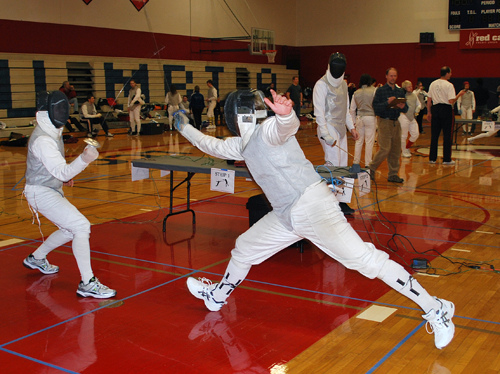Portland State’s fencing club is bringing the sport back to life at the Student Rec Center. The club hosts bi-weekly practices and competes in local tournaments against other Oregon and Washington universities.
The incredible world of fencing

Portland State’s fencing club is bringing the sport back to life at the Student Rec Center. The club hosts bi-weekly practices and competes in local tournaments against other Oregon and Washington universities.
The complex sport is more than just fighting with a sword. Fencing rewards intelligence and quick thinking. It’s also a unique way to exercise.
Coach Ethan Brown said the sport is not always what people expect.
“What most people want to hear about is not the footwork, but the blade work,” Brown said. “The slashing, clashing blade work. Blade work is not what you might expect from watching Hollywood movies, but instead focuses on quick, subtle motions and, rather than making lots of contact with your opponent’s blade, avoiding it if possible.”
The Portland State club has held a steady team since 2007 and is led by Brown, an 18-year veteran of the sport, and club president Todd Young, who began fencing as a young teenager. The team competes in matches twice per term. The most recent competition was Oregon’s “Three Quacks” event in February.
Portland State took home two first place finishes and one second place. Jeremy Graber won the saber competition, Patrick Quadar won épée, and Young took home a second in foil.
These three categories of weaponry and style—saber, épée and foil—represent the vastly different aspects of fencing.
“Each weapon has its own rules and nuances, but some of the basics—like how you stand and move—are pretty similar for all three,” Brown said. “Foil and épée are for stabbing only; you can’t slash or cut with them.
“However, the similarity ends there; in foil (and in saber), there’s a concept of ‘right-of-way,’ which determines who gets a point if both fencers hit each other at the same time. It’s complex, and often controversial, but it adds an extra dimension to foil and saber that’s lacking in épée.”
Young said that he got into fencing in middle school after he was dragged along by his sister, who was interested in the sport, but it turned out to be worth it for Young, who said he fell in love with the sport after his first practice.
“Fencing is a fast paced sport that is equal parts strategy and physical activity; it is relatively easy to start, but impossible to master,” Young said. “You can fence for the rest of your life without becoming bored of it.”
While fencing has a steep learning curve, Young and Brown encourage newcomers to the sport to give it a chance.
“One of its big advantages is that it’s a ‘lifetime sport,’” Brown said. “Children can start as early as six, and I know plenty of fencers who fence well into their 80s. It’s an active, warm community, with lots of opportunity to compete and make new friends. Most of all, though, fencing is incredibly fun.”
Young said that many of the 15 regular members had not fenced before joining the team. He said that Brown is excellent at teaching both novice and experienced fencers.
“Fencing is definitely not a sport for everyone,” Brown said. “The time and commitment required early on can be daunting. However, the people who do have the spark, and are willing to put in the time, will find in fencing one of the most rewarding sports in the world. The only way to know if you have that spark is to try it.”
Individuals interested in the sport are encouraged to drop into the team’s Monday and Friday practices. Monday’s times are 8:30 p.m. to 11 p.m. and Friday’s are 7 p.m. to 9 p.m. Young said newcomers are welcome to come to two practices to try out the sport without committing to the $15 student fee.
The Viking fencing club heads to their next match, the Senior Circuit, in Beaverton on May 6. Information on this match and all other fencing news can be found by going to www.fencing.groups.pdx.edu.





